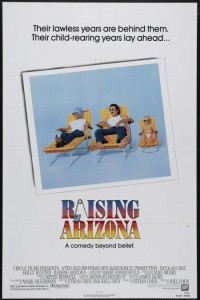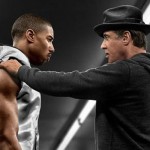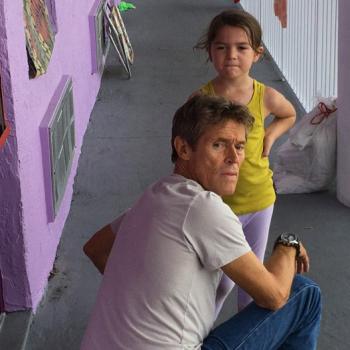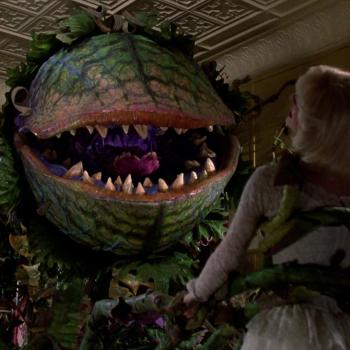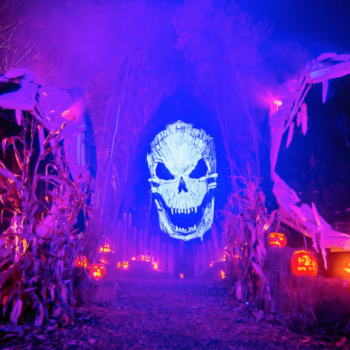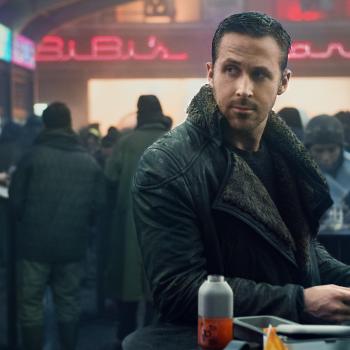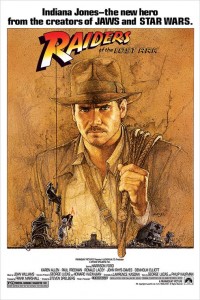
It’s long been cliché for a critic to lament that lists are meaningless, but I think they may have some benefits. Ranking “bests” might be silly, but I think knowing a person’s favorites gives us insight into who they are and helps establish a sort of “critic DNA” for the reviewers you follow. Plus, I really like to make lists.
So as we start this journey, I thought the best way to help you know a bit more about my tastes and outlooks would be to spend a few weeks listing some of my favorites. This week, we’re talking about films. Next week, we’ll delve into TV. Following that, we’ll look at some of the critics I follow and trust. And we’ll close by talking about several different things in the fourth week – the books, musicians, podcasts and other things I love that I feel put together my critical makeup. These aren’t the best things I’ve ever encountered, per se, but my favorites. They’re the comfort food I turn to when I need an uplift. They’re the works that have quieted my soul or prompted me to move forward. No matter how trivial some may seem, they all compose some part of who I am, what I love, and what I believe in. And I think it’s going to be fun to revisit them. Please, share yours in the comments!
As we talk about my favorite films, I admit there’s a part of me that wishes I had a more eclectic list. I would love to have a range of older movies, foreign films and documentaries on here. And yet, when I decided on my 20 “essentials” – the films that I keep coming back to, rewatching and talking about – I was surprised to find a rather populist selection for the most part. Part of that is because I didn’t grow up cherishing more challenging films – I didn’t discover how wide-ranging film was until college, so I still have a large backlog to catch up on. But more than that, I think what I love about film is the way it’s such a widely beloved medium. I love that we can be united by one particular story, or that a certain quote can work as shorthand between strangers. I’m happy to love the same films so many others do – I hope it means a lack of pretension and hipsterism on my part. And I also hope that should you see a film on here you love, you’ll also be encouraged to seek out something you may not have considered – I hope it’s a great entry point into a deeper conversation.
So, let’s get started.
- Raiders of the Lost Ark: Told you this list was populist; aside from maybe “Star Wars,” you don’t get much more mainstream than Indiana Jones. But there’s no other film that I’m willing to drop everything and watch at any time. Harrison Ford creates an iconic hero – intrepid, but with just enough human foibles to keep him from venturing into parody. Lawrence Kasdan’s script crackles, and Spielberg’s at the height of his powers. A perfect balance of wit, humor and pulp love. Escapism at its finest.
- The Muppet Movie: My happy place. “The Muppet Movie” is the best mixture of Jim Henson’s anarchic wit and naked earnestness. Paul Williams’ songs still retain their wit and power, and the film coasts on an optimism that makes every (purposefully) bad joke and groan-worthy pun enjoyable. Kermit, Piggy, Fozzie and Gonzo feel so real; despite their bizarre appearance, they have real emotions, flaws and dreams. It’s possibly the closest we’ll ever come to a Jim Henson biography – Kermit’s journey is his own, and the themes of friendship, artistry and joy are ones he came back to throughout his career. This is bliss via felt.
- The Tree of Life: Film as a worship experience. Terrence Malick’s 2011 film is the go-to response for any Christian who wants to prove they’re a true cineaste. But there’s a reason for it – it’s a film of unspeakable beauty and incredible depth. It moves with the rhythms of poetry rather than narrative; its scenes end in ellipses rather than periods. You can spend hours examining the film as prayer or a modern-day meditation on the book of Job. But I prefer to just turn the sound up and let Emmanuel Lubezki’s beautiful cinematography wash over me, taking me back to my childhood and leaving me slack-jawed at the awesomeness of the universe. Few films speak so directly to the soul.
- The “Before” Series: I know it’s a cheat. On their own, any of Richard Linklater’s three movies would earn a place on this list. But together, the saga of Jesse and Celine packs a cumulative wallop, examining not only modern love but the impact of time on a relationship. From the romantic idealism of “Before Sunrise” to the world-weary realism of “Before Midnight,” they tackle the way time, broken hearts and changing circumstances shape our look on love, passion and priorities. Few scenes are as beautiful as that listening booth scene in “Before Sunrise.” Few endings are as perfect as Celine doing her dance in “Before Sunset.” And few fights have ever felt as uncomfortably real as the one in “Before Midnight.” Three films have allowed Linklater, Ethan Hawke and Julie Delpy to turn the love story into an epic rumination on time and character. I look forward to taking a long walk with Jesse and Celine in another few years.
- It’s a Wonderful Life: The best and worst thing to happen to Frank Capra’s masterpiece has been its embrace as a Christmas movie. One the one hand, its ubiquity allowed it to become beloved by many. On the other, being a Yuletide classic means people still mistakenly regard Frank Capra’s masterpiece as a saccharine piffle. People forget the dark depths the film plumbs, the all-too-relatable discontent of George Bailey and its sober look at the cost of decency. James Stewart is wonderful, Donna Reed luminous. And the film has enough humor and heart to weather its bleak third act. Yes, no Christmas season is perfect without it. But it’s a film for all of seasons, especially for those of us who fear we may never escape our own Bedford Falls.
- Back to the Future: Possibly a perfect piece of pop entertainment. Bob Gale’s script is tight as a drum; Robert Zemeckis’ direction is funny, thrilling and light on its feet; the performances are perfectly calibrated; and Alan Silvestri’s score elevates every single moment. But for all the craft and sci-fi shenanigans, “Back to the Future” is still endlessly watchable because of its human story. We all wonder what our parents might have been like at our age – would we like them? Would we be embarrassed by them? Were they more like us than we might want to admit? There’s a warm heart beating beneath the smell of popcorn here.
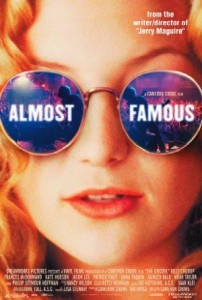
- Almost Famous: When I look at William Miller (Patrick Fugit), I see way too much of myself as a teenager – a painfully awkward, helplessly uncool kid who only wants to write about the art that’s so moved him. Cameron Crowe wrote about his own experiences as a “Rolling Stone” reporter, and you can feel the love in every needle drop. His writing has never been so personal, his love of characters so apparent, his work with actors so good. This is his opus – it’s so good that I don’t even have to mention Philip Seymour Hoffman’s amazing performance to feel that I have described it well. Crowe’s career has suffered since this film – I wonder if he said all he needed to say.
- Hell House: George Ratliffe’s 2001 documentary is painfully familiar and endlessly fascinating. It follows a Texas church that conducts a haunted house designed to literally scare the hell out of people. What I appreciate is how nonjudgmental Ratliffe is – he takes his subjects’ faith seriously and never pokes fun. But the film still raises important questions. Is the Gospel spread by fear? Can you love the sinner and show empathy when you’re turning real-life struggles into propaganda? Do hell houses provide a way for members to live vicariously through their judgments? The Christians here are recognizable; I’ve grown up with them. And the questions about Christianity, evangelism and love are all still incredibly relevant.
- The Truman Show: Peter Weir’s 1998 drama is best known as a herald of reality television, but I think there’s so much more to it than that. It’s a film about how our culture insulates us and sells us lies about safety and complacency. It’s about passion that rage against it, that will not stop searching for something greater until it hits the ends of the earth. It is a deeply moving, spiritual movie that also incorporates elements of sly satire. Jim Carrey is perfect here; his Truman is ever-so-slightly unbelievable, which makes sense as he’s been manipulated into becoming a persona to sell a TV show. Weir films everything in bright colors – somehow, light has never felt so sinister. A beautiful, power film that gains resonance every time I watch it.
- Rear Window: For my money, this is the best Hitchcock. “Rear Window” is a piece of amazing craftsmanship, taking place entirely in one room for the majority of its run time. It’s amazing how vivid Hitchcock makes this location – I love the way the sound bleeds in from across the courtyard and the way the entire apartment complex feels alive and vital. It’s like watching a great stage play. And then Hitchcock uses this material to craft a deliciously suspenseful tale of voyeurism and dangerous neighbors, mixed in with a none-too-subtle look at a man’s fears of domestic life. So rich and so much fun.
- Wall-E: Pixar at its best. Beautiful animation, loveable characters, biting satire. Andrew Stanton’s direction is impeccable and its questions about humanity are worth pondering.
- Taxi Driver: I’ve known Travis Bickle. Sometimes I’ve been Travis Bickle. Martin Scorsese and Paul Schrader create a searing, painful look at loneliness. Deniro’s work here is why we’ve forgiven him his “Little Fockers” and “Dirty Grandpas.”
- Raising Arizona: Maybe not the best Coens, but it’s certainly my favorite. The dialogue is pure redneck poetry (“her insides were a rocky place where my seed could find no purchase” may be my favorite line of dialogue ever). This bizarre, hilarious tale of better parenting through kidnapping moves with amazing energy and inventiveness, powered by a sublime performance by Nicolas Cage.
- Groundhog Day: Ecclesiastes as a romantic comedy. The perfect combination of Bill Murray’s sarcasm, charisma and pathos. A charming, funny movie that packs surprising depth and soul.
- Alien: Ridley Scott’s terrifying haunted house in the stars. Creepy, gross and packed with subtext that oozes under your skin. I still close my eyes when Tom Skerritt enters that ventilation shaft.
- The Naked Gun: You may prefer “Airplane” to “The Naked Gun.” But Frank Drebin’s first adventure still provokes guffaws every time. The jokes come like machine-gun fire. Sure, Leslie Nieslen peeing with his microphone on is juvenile; it’s also hilarious.
- Babette’s Feast: A rebuke to legalism and a celebration of community. A film that reminds us of the goodness of life and the extravagance of grace. Beautiful, warm-hearted and tender.
- Eternal Sunshine of the Spotless Mind: Michel Gondry’s masterpiece is the most painful, probing look at relationships in decades. A smart rumination on memory, regret and the mistakes we continue to make. Haunting imagery, fantastic performances and a smart, funny script.
- Rocky: Forget the sequels. They’re enjoyable, but John Avildsen’s original is the real deal. “Rocky” is a wonderful love story, with heartbreaking performances by Stallone and Talia Shire. It’s the best of the underdog stories and the most inspiring of sports tales. It’s cliché to call it a knockout, but it’s not incorrect.
- Step Brothers: The heart wants what the heart wants. And in this case, it wants Will Ferrell and John C. Reilly as middle-aged man children wreaking havoc on their parents’ marriage. Insanely juvenile, demented and bizarre, it’s a masterpiece in surreal humor and improvisation, and a sly critique of Peter Pan culture. Sophomoric? Sure. But no movie still causes tears of laughter like this one.

